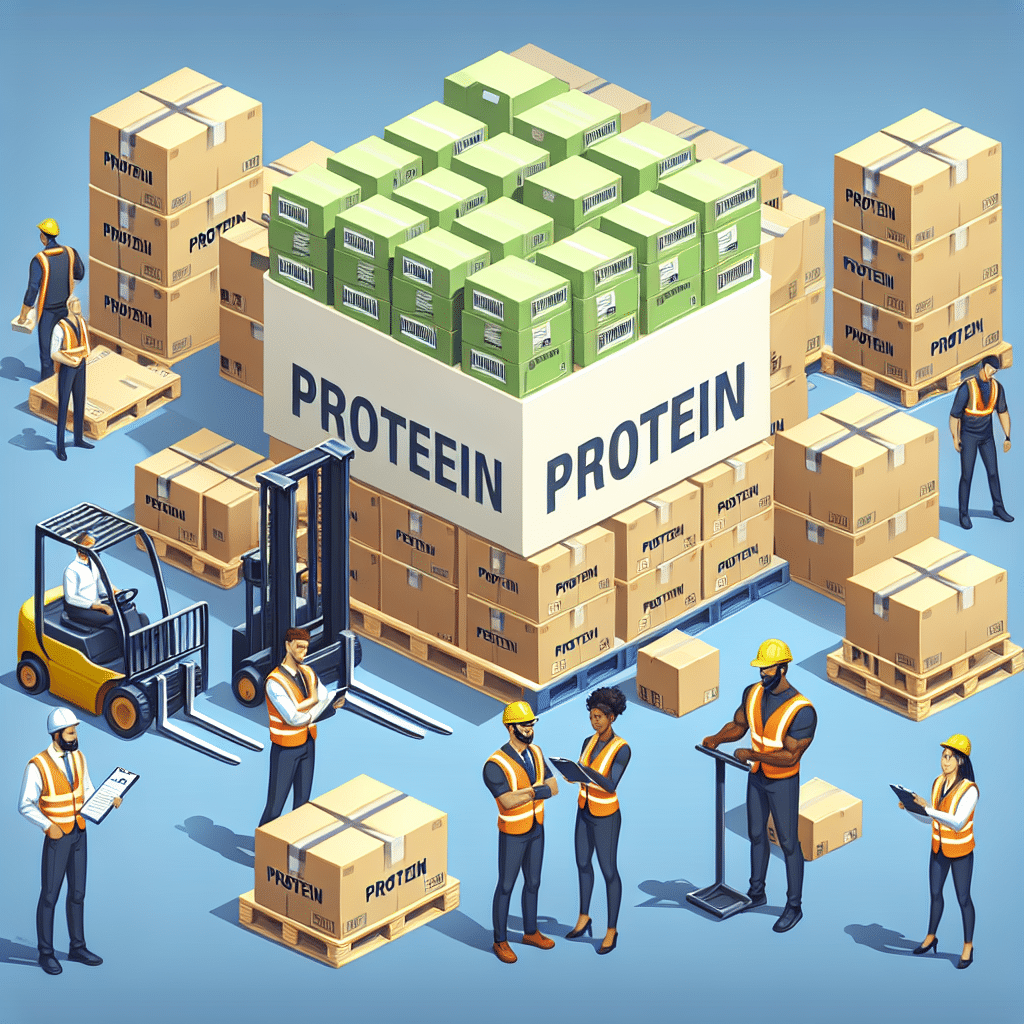Wholesale Protein for Retailers: Stock Up Wisely
-
Table of Contents
- Wholesale Protein for Retailers: Smart Inventory Strategies
- Understanding the Protein Market Demand
- Choosing the Right Protein Types for Your Audience
- Assessing Quality and Certifications
- Inventory Management: Balancing Variety and Volume
- Pricing Strategies for Competitive Advantage
- Marketing and Education: The Key to Sales Growth
- Case Studies: Success Stories in Retail Protein Sales
- Conclusion: Key Takeaways for Retailers
- Discover ETprotein’s Premium Protein Offerings
Wholesale Protein for Retailers: Smart Inventory Strategies

For retailers in the health and wellness industry, stocking up on wholesale protein is a strategic move that can lead to increased sales and customer loyalty. Protein supplements are in high demand as consumers become more health-conscious and seek convenient ways to support their fitness goals and dietary needs. However, navigating the wholesale protein market requires careful planning and consideration to ensure that you’re making wise purchasing decisions. In this article, we’ll explore the key factors retailers should consider when stocking up on wholesale protein.
Understanding the Protein Market Demand
The global protein supplement market has been growing steadily, driven by factors such as rising health awareness, the popularity of fitness regimes, and the growing adoption of high-protein diets. According to a report by Grand View Research, the global dietary supplements market size was valued at USD 140.3 billion in 2020 and is expected to expand at a compound annual growth rate (CAGR) of 8.6% from 2021 to 2028. This growth trajectory suggests a promising opportunity for retailers to capitalize on the protein trend.
Choosing the Right Protein Types for Your Audience
When selecting wholesale protein for your retail store, it’s crucial to understand the preferences and needs of your target market. There are various types of protein supplements available, each with its own set of benefits:
- Whey Protein: Popular among athletes and bodybuilders for its fast absorption and high amino acid content.
- Casein Protein: Known for its slow digestion, making it ideal for sustained protein release.
- Plant-Based Proteins: Such as pea, rice, and hemp proteins, these are favored by vegans and those with dairy allergies.
- Specialty Proteins: These include collagen for skin and joint health, and bone broth protein for gut health and immunity.
Understanding the unique selling points of each protein type will help you curate a product range that resonates with your customers.
Assessing Quality and Certifications
Quality is paramount when it comes to dietary supplements. Retailers should prioritize sourcing protein from reputable manufacturers that adhere to strict quality control standards. Look for certifications such as NSF, GMP (Good Manufacturing Practices), and third-party testing to ensure product purity and potency. Additionally, consider the growing demand for organic and non-GMO products, as these attributes can be significant selling points for health-conscious consumers.
Inventory Management: Balancing Variety and Volume
Effective inventory management is critical for retailers stocking wholesale protein. It’s a delicate balance between offering a diverse product range and avoiding overstocking, which can lead to expired products and financial losses. Consider the following strategies:
- Analyze sales data to identify top-selling products and adjust your inventory accordingly.
- Implement a just-in-time (JIT) inventory system to reduce holding costs and minimize waste.
- Offer pre-order options for niche or specialty products to gauge interest before committing to large quantities.
By staying data-driven and customer-focused, retailers can optimize their protein inventory for maximum profitability.
Pricing Strategies for Competitive Advantage
Pricing is a critical factor in the retail landscape. To remain competitive, retailers must find a balance between offering value to customers and maintaining healthy profit margins. Consider implementing tiered pricing for bulk purchases or loyalty discounts to encourage repeat business. Additionally, keep an eye on competitor pricing and be prepared to adjust your strategy to stay competitive.
Marketing and Education: The Key to Sales Growth
Effective marketing and consumer education are essential for driving sales of protein supplements. Retailers should invest in educational materials that highlight the benefits and uses of different protein types. In-store displays, workshops, and collaboration with local fitness professionals can also enhance product visibility and credibility. Online marketing efforts, such as social media campaigns and influencer partnerships, can further expand your reach.
Case Studies: Success Stories in Retail Protein Sales
Several retailers have successfully capitalized on the protein supplement trend by implementing the strategies discussed above. For example, a health food store in California increased its protein sales by 25% after introducing a range of plant-based proteins and hosting monthly fitness and nutrition workshops. Another retailer, an online supplement store, saw a 40% increase in repeat customers by offering a loyalty program and personalized product recommendations based on purchase history.
Conclusion: Key Takeaways for Retailers
Stocking wholesale protein can be a lucrative venture for retailers, but it requires a strategic approach. Understanding market demand, selecting the right product mix, ensuring quality, managing inventory wisely, setting competitive prices, and investing in marketing and education are all crucial components of success. By focusing on these areas, retailers can build a loyal customer base and grow their protein supplement sales.
Discover ETprotein’s Premium Protein Offerings
If you’re looking to source high-quality wholesale protein for your retail business, consider ETprotein’s extensive range of products. ETprotein is a leading Chinese factory manufacturer and supplier of organic bulk vegan protein and plant proteins. Their offerings include:
- Organic Rice Protein
- Clear Rice Protein
- Pea Protein
- Clear Pea Protein
- Pumpkin Seed Protein
- Sunflower Seed Protein
- Mung Bean Protein
- Peanut Protein
ETprotein’s products are characterized by their neutral taste, non-GMO, and allergen-free attributes, making them suitable for a wide range of industries. With a commitment to quality and customer satisfaction, ETprotein is a trusted partner for retailers looking to enhance their protein supplement offerings.
About ETprotein:
ETprotein, a reputable protein Chinese factory manufacturer and supplier, is renowned for producing, stocking, exporting, and delivering the highest quality organic bulk vegan protein and plant proteins. They include Organic rice protein, clear rice protein, pea protein, clear pea protein, pumpkin seed protein, sunflower seed protein, mung bean protein, peanut protein etc. Their offerings, characterized by a neutral taste, non-GMO, allergen-free attributes, cater to a diverse range of industries. They serve nutraceutical, pharmaceutical, cosmeceutical, veterinary, as well as food and beverage finished product distributors, traders, and manufacturers across Europe, USA, Canada, Australia, Thailand, Japan, Korea, Brazil, and Chile, among others.
ETprotein specialization includes exporting and delivering tailor-made protein powder and finished nutritional supplements. Their extensive product range covers sectors like Food and Beverage, Sports Nutrition, Weight Management, Dietary Supplements, Health and Wellness Products, and Infant Formula, ensuring comprehensive solutions to meet all your protein needs.
As a trusted company by leading global food and beverage brands and Fortune 500 companies, ETprotein reinforces China’s reputation in the global arena. For more information or to sample their products, please contact them and email sales(at)ETprotein.com today.














